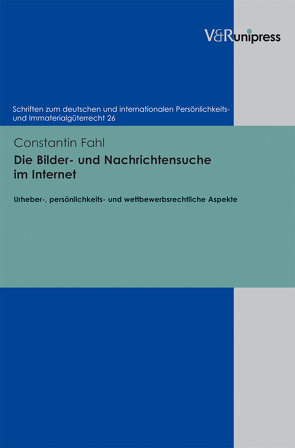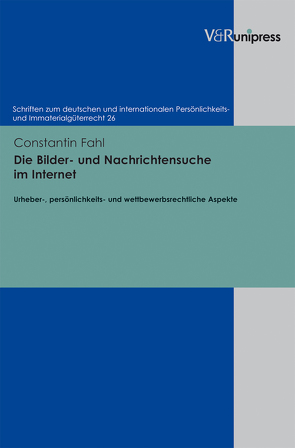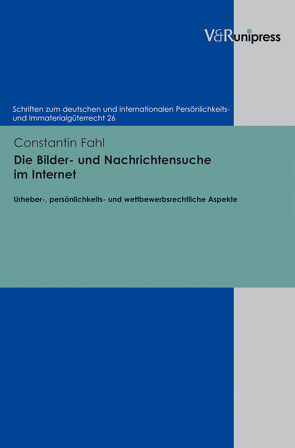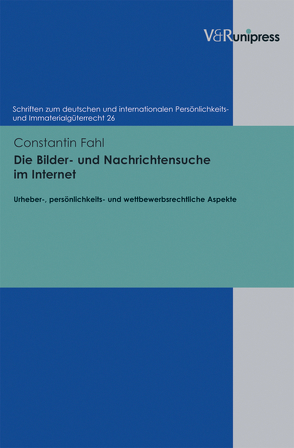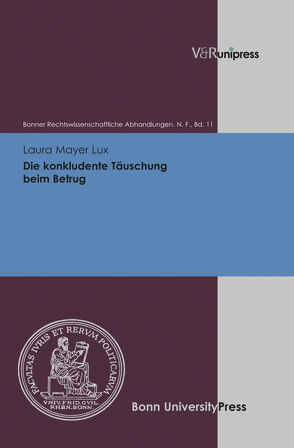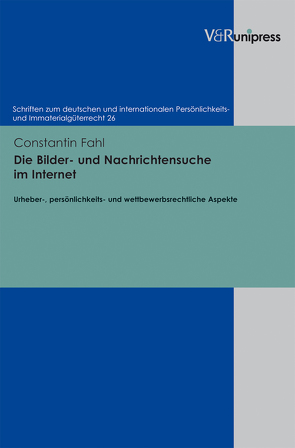Urheber-, persönlichkeits- und wettbewerbsrechtliche Zulässigkeit von Informationsbereitstellung durch Suchmaschinen.
Aktualisiert: 2023-06-28
> findR *
Urheber-, persönlichkeits- und wettbewerbsrechtliche Zulässigkeit von Informationsbereitstellung durch Suchmaschinen.
Aktualisiert: 2023-06-28
> findR *
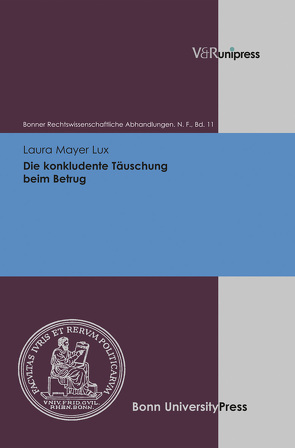
Die meisten Definitionsversuche von konkludenter Täuschung kommen über Leerformeln – etwa die »Verkehrsauffassung« – nicht hinaus. Im Gegensatz dazu kann Laura Mayer Lux aufzeigen, dass die schlüssige Täuschung eine aktive Täuschung ist, die einer unwahren Behauptung über betrugsrelevante Tatsachen entspricht. Mithilfe der analytischen Sprachphilosophie begründet die Autorin Betrug als »Kommunikationsdelikt« theoretisch und bestimmt Täuschung mit Bezug auf die kommunikative Interaktion zwischen Täter und Getäuschtem. Vor diesem Hintergrund wird deutlich, dass die konkludente Täuschung als »semantischer Schluss« bezeichnet werden kann, also als ein Schluss, der im Hinblick auf die Bedeutung des fraglichen kommunikativen Aktes konstruiert wird, und als »indirekte unwahre Informationsbehauptung« verstanden werden muss. This study seeks to contribute, through the analytical philosophy of language, to a theoretical framework of fraud as a “communication offense”. It also aims at determining the meaning of the deceit element – particularly, implied or tacit deceit – with reference to the communicative interaction between the offender and the victim of the deception. A thorough study of definitions of tacit deceit reveals that most researches come out with “empty formulas” – such as “prevailing public understanding” – which are unable to specify the deceit element. By contrast, this study argues that tacit deceit should be referred to as an active deceit. That is, an untrue statement about fraud-relevant facts, i.e., information which, depending on the economic relationship, may act as a determining factor for a rational disposition of property. Finally, this research clarifies tacit deceit as a “semantic deduction”, i.e., a deduction that is constructed in view of the meaning of the communicative act under analysis, and proposes that tacit deceit should be interpreted as an “indirect false assertion about information”
Aktualisiert: 2023-06-28
> findR *
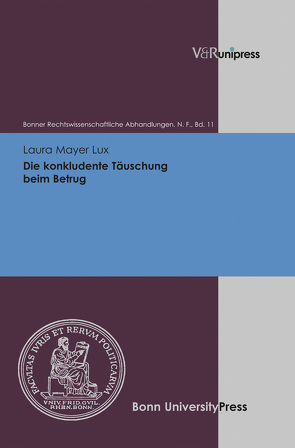
Die meisten Definitionsversuche von konkludenter Täuschung kommen über Leerformeln – etwa die »Verkehrsauffassung« – nicht hinaus. Im Gegensatz dazu kann Laura Mayer Lux aufzeigen, dass die schlüssige Täuschung eine aktive Täuschung ist, die einer unwahren Behauptung über betrugsrelevante Tatsachen entspricht. Mithilfe der analytischen Sprachphilosophie begründet die Autorin Betrug als »Kommunikationsdelikt« theoretisch und bestimmt Täuschung mit Bezug auf die kommunikative Interaktion zwischen Täter und Getäuschtem. Vor diesem Hintergrund wird deutlich, dass die konkludente Täuschung als »semantischer Schluss« bezeichnet werden kann, also als ein Schluss, der im Hinblick auf die Bedeutung des fraglichen kommunikativen Aktes konstruiert wird, und als »indirekte unwahre Informationsbehauptung« verstanden werden muss. This study seeks to contribute, through the analytical philosophy of language, to a theoretical framework of fraud as a “communication offense”. It also aims at determining the meaning of the deceit element – particularly, implied or tacit deceit – with reference to the communicative interaction between the offender and the victim of the deception. A thorough study of definitions of tacit deceit reveals that most researches come out with “empty formulas” – such as “prevailing public understanding” – which are unable to specify the deceit element. By contrast, this study argues that tacit deceit should be referred to as an active deceit. That is, an untrue statement about fraud-relevant facts, i.e., information which, depending on the economic relationship, may act as a determining factor for a rational disposition of property. Finally, this research clarifies tacit deceit as a “semantic deduction”, i.e., a deduction that is constructed in view of the meaning of the communicative act under analysis, and proposes that tacit deceit should be interpreted as an “indirect false assertion about information”
Aktualisiert: 2023-06-28
> findR *

Die meisten Definitionsversuche von konkludenter Täuschung kommen über Leerformeln – etwa die »Verkehrsauffassung« – nicht hinaus. Im Gegensatz dazu kann Laura Mayer Lux aufzeigen, dass die schlüssige Täuschung eine aktive Täuschung ist, die einer unwahren Behauptung über betrugsrelevante Tatsachen entspricht. Mithilfe der analytischen Sprachphilosophie begründet die Autorin Betrug als »Kommunikationsdelikt« theoretisch und bestimmt Täuschung mit Bezug auf die kommunikative Interaktion zwischen Täter und Getäuschtem. Vor diesem Hintergrund wird deutlich, dass die konkludente Täuschung als »semantischer Schluss« bezeichnet werden kann, also als ein Schluss, der im Hinblick auf die Bedeutung des fraglichen kommunikativen Aktes konstruiert wird, und als »indirekte unwahre Informationsbehauptung« verstanden werden muss. This study seeks to contribute, through the analytical philosophy of language, to a theoretical framework of fraud as a “communication offense”. It also aims at determining the meaning of the deceit element – particularly, implied or tacit deceit – with reference to the communicative interaction between the offender and the victim of the deception. A thorough study of definitions of tacit deceit reveals that most researches come out with “empty formulas” – such as “prevailing public understanding” – which are unable to specify the deceit element. By contrast, this study argues that tacit deceit should be referred to as an active deceit. That is, an untrue statement about fraud-relevant facts, i.e., information which, depending on the economic relationship, may act as a determining factor for a rational disposition of property. Finally, this research clarifies tacit deceit as a “semantic deduction”, i.e., a deduction that is constructed in view of the meaning of the communicative act under analysis, and proposes that tacit deceit should be interpreted as an “indirect false assertion about information”
Aktualisiert: 2023-06-28
> findR *
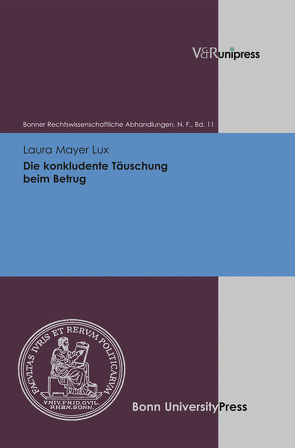
Die meisten Definitionsversuche von konkludenter Täuschung kommen über Leerformeln – etwa die »Verkehrsauffassung« – nicht hinaus. Im Gegensatz dazu kann Laura Mayer Lux aufzeigen, dass die schlüssige Täuschung eine aktive Täuschung ist, die einer unwahren Behauptung über betrugsrelevante Tatsachen entspricht. Mithilfe der analytischen Sprachphilosophie begründet die Autorin Betrug als »Kommunikationsdelikt« theoretisch und bestimmt Täuschung mit Bezug auf die kommunikative Interaktion zwischen Täter und Getäuschtem. Vor diesem Hintergrund wird deutlich, dass die konkludente Täuschung als »semantischer Schluss« bezeichnet werden kann, also als ein Schluss, der im Hinblick auf die Bedeutung des fraglichen kommunikativen Aktes konstruiert wird, und als »indirekte unwahre Informationsbehauptung« verstanden werden muss. This study seeks to contribute, through the analytical philosophy of language, to a theoretical framework of fraud as a “communication offense”. It also aims at determining the meaning of the deceit element – particularly, implied or tacit deceit – with reference to the communicative interaction between the offender and the victim of the deception. A thorough study of definitions of tacit deceit reveals that most researches come out with “empty formulas” – such as “prevailing public understanding” – which are unable to specify the deceit element. By contrast, this study argues that tacit deceit should be referred to as an active deceit. That is, an untrue statement about fraud-relevant facts, i.e., information which, depending on the economic relationship, may act as a determining factor for a rational disposition of property. Finally, this research clarifies tacit deceit as a “semantic deduction”, i.e., a deduction that is constructed in view of the meaning of the communicative act under analysis, and proposes that tacit deceit should be interpreted as an “indirect false assertion about information”
Aktualisiert: 2023-05-28
> findR *
Urheber-, persönlichkeits- und wettbewerbsrechtliche Zulässigkeit von Informationsbereitstellung durch Suchmaschinen.
Aktualisiert: 2023-05-28
> findR *
Urheber-, persönlichkeits- und wettbewerbsrechtliche Zulässigkeit von Informationsbereitstellung durch Suchmaschinen.
Aktualisiert: 2019-04-23
> findR *
Aktualisiert: 2019-04-23
> findR *
Urheber-, persönlichkeits- und wettbewerbsrechtliche Zulässigkeit von Informationsbereitstellung durch Suchmaschinen.
Aktualisiert: 2023-04-28
> findR *
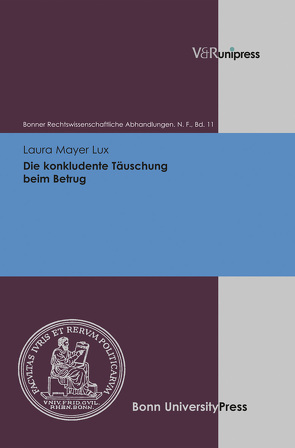
Die meisten Definitionsversuche von konkludenter Täuschung kommen über Leerformeln – etwa die »Verkehrsauffassung« – nicht hinaus. Im Gegensatz dazu kann Laura Mayer Lux aufzeigen, dass die schlüssige Täuschung eine aktive Täuschung ist, die einer unwahren Behauptung über betrugsrelevante Tatsachen entspricht. Mithilfe der analytischen Sprachphilosophie begründet die Autorin Betrug als »Kommunikationsdelikt« theoretisch und bestimmt Täuschung mit Bezug auf die kommunikative Interaktion zwischen Täter und Getäuschtem. Vor diesem Hintergrund wird deutlich, dass die konkludente Täuschung als »semantischer Schluss« bezeichnet werden kann, also als ein Schluss, der im Hinblick auf die Bedeutung des fraglichen kommunikativen Aktes konstruiert wird, und als »indirekte unwahre Informationsbehauptung« verstanden werden muss. This study seeks to contribute, through the analytical philosophy of language, to a theoretical framework of fraud as a “communication offense”. It also aims at determining the meaning of the deceit element – particularly, implied or tacit deceit – with reference to the communicative interaction between the offender and the victim of the deception. A thorough study of definitions of tacit deceit reveals that most researches come out with “empty formulas” – such as “prevailing public understanding” – which are unable to specify the deceit element. By contrast, this study argues that tacit deceit should be referred to as an active deceit. That is, an untrue statement about fraud-relevant facts, i.e., information which, depending on the economic relationship, may act as a determining factor for a rational disposition of property. Finally, this research clarifies tacit deceit as a “semantic deduction”, i.e., a deduction that is constructed in view of the meaning of the communicative act under analysis, and proposes that tacit deceit should be interpreted as an “indirect false assertion about information”
Aktualisiert: 2023-04-28
> findR *
MEHR ANZEIGEN
Bücher zum Thema Einwilligung, konkludente
Sie suchen ein Buch über Einwilligung, konkludente? Bei Buch findr finden Sie eine große Auswahl Bücher zum
Thema Einwilligung, konkludente. Entdecken Sie neue Bücher oder Klassiker für Sie selbst oder zum Verschenken. Buch findr
hat zahlreiche Bücher zum Thema Einwilligung, konkludente im Sortiment. Nehmen Sie sich Zeit zum Stöbern und finden Sie das
passende Buch für Ihr Lesevergnügen. Stöbern Sie durch unser Angebot und finden Sie aus unserer großen Auswahl das
Buch, das Ihnen zusagt. Bei Buch findr finden Sie Romane, Ratgeber, wissenschaftliche und populärwissenschaftliche
Bücher uvm. Bestellen Sie Ihr Buch zum Thema Einwilligung, konkludente einfach online und lassen Sie es sich bequem nach
Hause schicken. Wir wünschen Ihnen schöne und entspannte Lesemomente mit Ihrem Buch.
Einwilligung, konkludente - Große Auswahl Bücher bei Buch findr
Bei uns finden Sie Bücher beliebter Autoren, Neuerscheinungen, Bestseller genauso wie alte Schätze. Bücher zum
Thema Einwilligung, konkludente, die Ihre Fantasie anregen und Bücher, die Sie weiterbilden und Ihnen wissenschaftliche
Fakten vermitteln. Ganz nach Ihrem Geschmack ist das passende Buch für Sie dabei. Finden Sie eine große Auswahl
Bücher verschiedenster Genres, Verlage, Autoren bei Buchfindr:
Sie haben viele Möglichkeiten bei Buch findr die passenden Bücher für Ihr Lesevergnügen zu entdecken. Nutzen Sie
unsere Suchfunktionen, um zu stöbern und für Sie interessante Bücher in den unterschiedlichen Genres und Kategorien
zu finden. Unter Einwilligung, konkludente und weitere Themen und Kategorien finden Sie schnell und einfach eine Auflistung
thematisch passender Bücher. Probieren Sie es aus, legen Sie jetzt los! Ihrem Lesevergnügen steht nichts im Wege.
Nutzen Sie die Vorteile Ihre Bücher online zu kaufen und bekommen Sie die bestellten Bücher schnell und bequem
zugestellt. Nehmen Sie sich die Zeit, online die Bücher Ihrer Wahl anzulesen, Buchempfehlungen und Rezensionen zu
studieren, Informationen zu Autoren zu lesen. Viel Spaß beim Lesen wünscht Ihnen das Team von Buchfindr.
